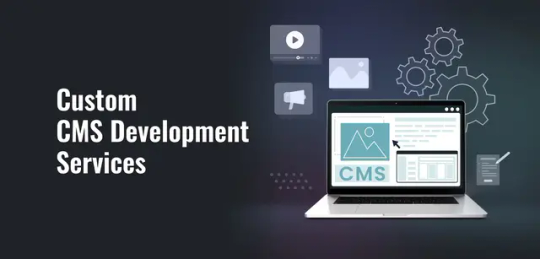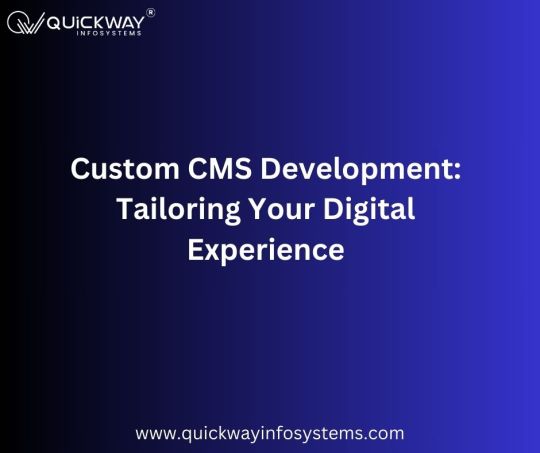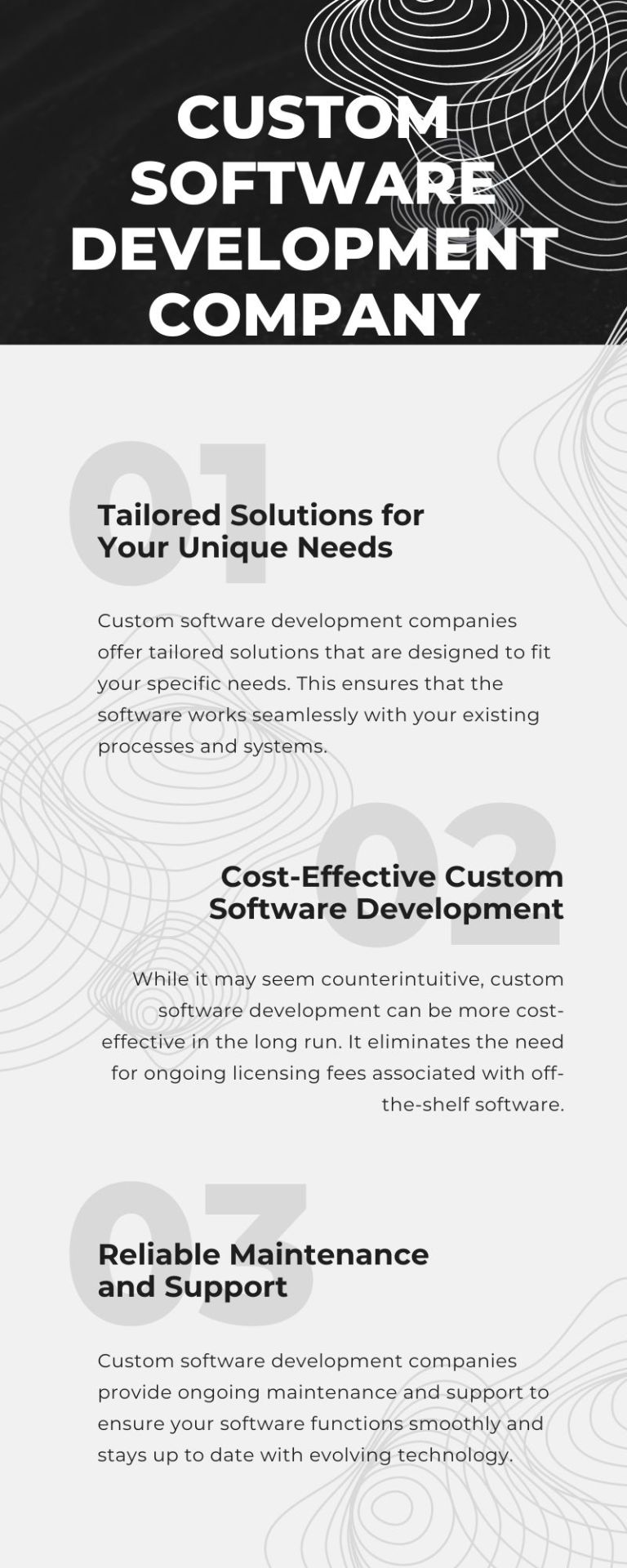#Custom CMS Development Services
Explore tagged Tumblr posts
Text
Simplify, integrate, and grow with ERP.

At AI Solutions, Qatar, we offer ERP development services aimed at streamlining, consolidating, and promoting business expansion. Our custom-made ERP solutions organize operations, improve data handling, and automate processes, making your business more responsive and efficient. By embracing latest technologies, we create an uncomplicated connectivity between all departments with real-time insights and better decision-making. Our promise is to provide easy-to-use, scalable ERP solutions that fit your specific business requirements, enhancing productivity and profitability. Join forces with AI Solutions to revolutionize your business processes and sustain long-term growth.
#cms development company#cms development company in Qatar#cms development services in Qatar#custom cms development company#custom cms development services#cms website development company#enterprise cms development#cms web development company#cms development services#open source cms development company#erp software company#custom ERP software development service#leading ERP development company#leading ERP development#custom ERP solutions#top custom ERP software development#top custom ERP software development company#content management system#content management system development#business development#mobile application development
0 notes
Text
Custom CMS Development Services: Empowering Your Digital Presence
In today’s competitive digital landscape, managing website content effectively is key to staying ahead. Businesses require robust, scalable, and user-friendly solutions that allow them to control, update, and optimize their online presence without relying heavily on technical expertise. This is where custom CMS development services come into play. With a tailored content management system, organizations can streamline operations, enhance productivity, and deliver a superior user experience—all while retaining complete control over their digital assets.
Why Opt for a Custom CMS?
A custom CMS is designed to address the unique requirements of your business. Unlike off-the-shelf solutions, a custom-built CMS provides flexibility, scalability, and performance enhancements that align perfectly with your operational needs. With Dream Cyber Infoway at the helm, businesses receive a solution that is not only tailored to their specific workflows but also optimized for future growth. The advantages include:
Tailored Functionality: Every business has unique needs. A custom CMS can be built with the exact features required—be it advanced analytics, multi-language support, or custom workflows—ensuring that your content strategy is seamlessly executed.
Enhanced Security: Pre-built CMS platforms often come with vulnerabilities that can be exploited by cybercriminals. Custom CMS development allows for robust security measures, including custom encryption protocols and secure user authentication, safeguarding your data and maintaining user trust.
Scalability: As your business grows, your CMS must evolve. A custom solution is designed to scale, supporting an increasing amount of content, users, and data without compromising performance.
Improved Performance: Optimized for speed and efficiency, a custom CMS minimizes loading times and ensures that your website remains fast and responsive, which is critical for user engagement and SEO rankings.
The Dream Cyber Infoway Advantage
At Dream Cyber Infoway, we specialize in custom CMS development services that empower businesses to unlock their digital potential. Our team of seasoned developers and designers leverages the latest technologies and industry best practices to build CMS solutions that are robust, secure, and tailored to your unique needs.
Our approach is client-centric, meaning we work closely with you to understand your business processes, challenges, and goals. This collaboration ensures that the final product not only meets your expectations but also provides a competitive edge in your market. Whether you require a CMS for an eCommerce platform, corporate website, or content-heavy portal, our custom solutions are designed to deliver maximum efficiency and flexibility.
Key Features of Our Custom CMS Solutions
User-Friendly Interface: We prioritize intuitive design and usability, ensuring that your team can easily manage and update content without needing extensive technical training.
Responsive Design: Our CMS solutions are built with responsiveness in mind, providing a seamless experience across all devices—from desktops to mobile phones.
Robust Integration Capabilities: Modern businesses rely on a multitude of tools and platforms. Our CMS is designed to integrate smoothly with other systems such as CRM platforms, marketing automation tools, and social media channels.
SEO Optimization: We build our CMS solutions with SEO best practices in mind. This includes customizable URL structures, metadata management, and performance optimizations to help your website rank higher on search engines.
Custom Workflows and Automation: Streamline your operations with custom workflows that automate repetitive tasks, enhance collaboration, and ensure that your content goes live without unnecessary delays.
Ongoing Support and Maintenance: Our commitment doesn’t end at deployment. Dream Cyber Infoway offers ongoing support, regular updates, and maintenance services to ensure that your CMS remains secure and efficient as your business evolves.
Transforming Your Digital Strategy
Implementing a custom CMS is more than just a technological upgrade—it’s a strategic move that can transform how your business manages its digital content. By leveraging our custom CMS development services, you gain a powerful tool that not only simplifies content management but also drives better engagement, improved conversion rates, and sustained business growth.
In conclusion, as the digital landscape continues to evolve, having a robust, customized CMS is crucial for maintaining a competitive edge. Dream Cyber Infoway is dedicated to providing innovative, secure, and scalable custom CMS development services that empower businesses to take full control of their online presence. If you’re ready to revolutionize your content management strategy and unlock new opportunities, get in touch with us today and discover how our tailored solutions can transform your digital future.
0 notes
Text
Building a Scalable Website: The Role of Custom CMS Development
Introduction
In the fast-paced digital era, a website isn’t just an online presence, it’s the cornerstone of a business’s growth strategy. However, as businesses grow, so do their demands for functionality, user experience, and performance. This is where scalability becomes essential. A scalable website ensures that your digital platform can handle increasing traffic, content, and integrations without compromising performance. Custom CMS (Content Management System) development plays a crucial role in enabling this scalability. In this blog, we’ll explore how a custom CMS can be the key to building a robust, scalable website that evolves with your business needs.

Understanding Website Scalability
Scalability refers to a website's ability to accommodate growth, whether it’s an increase in user traffic, expanding content libraries, or integrating new functionalities. A scalable website ensures consistent performance even under heavy loads, minimizing downtime and enhancing user experience.
Why Choose Custom CMS for Scalability?
Instead of off-the-shelf CMS platforms, custom CMS systems are made to your exact specifications and provide unmatched flexibility and control. This bespoke approach ensures your website infrastructure can scale seamlessly as your business grows.
Key Roles of Custom CMS in Building Scalable Websites
Flexible Architecture: Custom CMS platforms are designed with a modular architecture, enabling you to add new features or functionalities without disrupting the existing framework. Whether you’re integrating e-commerce capabilities or adding multilingual support, a custom CMS ensures scalability without compromising performance.
Optimized Performance: As your website scales, performance optimization becomes critical. Custom CMS solutions allow developers to fine-tune code, databases, and server configurations to ensure fast load times and seamless user experiences, even during traffic spikes.
Advanced Content Management: A growing website often means managing vast amounts of content. Custom CMS platforms streamline content workflows, offering features like bulk uploads, advanced categorization, and automated scheduling to handle expanding content libraries efficiently.
Seamless Integrations: As businesses grow, they often need to integrate third-party tools such as CRM systems, analytics platforms, and marketing automation tools. Custom CMS solutions are built to support seamless integrations, ensuring that your website scales in sync with your business operations.
Enhanced Security: Growth often attracts more security threats, making robust protection essential. A custom CMS offers advanced security measures tailored to your website’s needs, such as custom firewalls, encryption protocols, and regular vulnerability assessments, ensuring scalability doesn’t compromise safety.
Support for Multi-Site Management: For businesses expanding into new markets or launching sub-brands, multi-site management becomes a necessity. A custom CMS allows for the creation and management of multiple websites under a unified backend, streamlining operations and maintaining brand consistency.
Future-Ready Development: Custom CMS platforms are built with the future in mind. By leveraging technologies like headless CMS architecture, they enable businesses to scale across multiple channels—websites, mobile apps, IoT devices, and more—ensuring adaptability in an ever-evolving digital landscape.
Real-Life Example: Custom CMS in Action
Consider an e-commerce website experiencing rapid growth in both traffic and product inventory. If the website has a custom CMS, it can:
Scale its database to accommodate millions of product listings.
Implement AI-driven search functionality for better user experience.
Integrate seamlessly with logistics and payment gateways.
This tailored approach ensures that the business can handle growth without interruptions.
Conclusion
Building a scalable website is no longer a luxury, it’s a necessity for businesses aiming for sustainable growth. Custom CMS website development offers the flexibility, performance optimization, and future-proof capabilities needed to support your website as it evolves. By investing in a custom CMS website development services, businesses can not only meet today’s demands but also be prepared for tomorrow’s challenges. Whether you’re planning for increased traffic, expanding content, or integrating cutting-edge technologies, custom CMS development is the foundation for a scalable, successful website.
1 note
·
View note
Text

Streamlined Content, Seamless Management
Our CMS development services bring a fully customizable & user-friendly content management system to your fingertips. Effortlessly manage updates & keep your audience engaged at all times. Get started now!
0 notes
Text

Magento enables simple incorporation of Google Analytics that assists in getting an insight into demand supply value chain and user behaviour.
Get service - https://www.yuvrajraulji.com/services/
0 notes
Text
New web developers often make mistakes that can impact the quality of their work. In our latest blog, we explore the most common errors and offer practical advice on how to avoid them. From understanding client requirements to optimizing website performance, these tips will help you build better websites. Visit Digital4Design to learn how you can improve your development process and deliver top-notch results!
Read our Blog Now - https://www.digital4design.com/what-are-the-common-mistakes-new-web-developers-make-and-how-to-avoid-them/
#web development company#Digital marketing and web development company#Evolution of web development#Custom software development#best website design and seo company#Web design company#Web development services#Custom CMS development services#Craft cms developers#Craft cms development
0 notes
Text
Custom CMS Development: Tailoring Your Digital Experience

The Need for Custom CMS Solutions
While off-the-shelf Content Management Systems (CMS) offer convenience, they often fall short in meeting the unique requirements of businesses. This is where custom CMS development comes into play. By creating a tailored CMS, organizations can streamline workflows, enhance user experiences, and gain a competitive edge.
Benefits of a Custom CMS
Tailored Functionality: Precisely match the CMS to your business processes.
Enhanced User Experience: Create a seamless and intuitive interface for content management.
Improved Security: Implement robust security measures to protect sensitive data.
Scalability: Accommodate future growth and expansion.
Integration Capabilities: Seamlessly connect with other systems and applications.
Competitive Advantage: Differentiate your business with a unique digital platform.
Choosing the Right Custom CMS Development Company
Selecting a reliable custom CMS development company is crucial for project success. Consider these factors:
Expertise: Look for companies with a proven track record in CMS development.
Portfolio: Review their previous projects to assess their capabilities.
Client Reviews: Read testimonials to understand their reputation.
Technology Stack: Ensure they are proficient in relevant technologies.
Project Management: Evaluate their project management methodologies.
Cost: Compare pricing while considering the overall value and quality.
The Role of India in Custom CMS Development
India has emerged as a leading hub for custom CMS development services. Offering a combination of cost-effectiveness, skilled developers, and a strong IT infrastructure, India-based companies have gained a global reputation.
Cost-effective development: Enjoy significant savings without compromising quality.
Large talent pool: Access a vast number of experienced CMS developers.
Time zone advantages: Efficient collaboration with developers in the same time zone.
Proven track record: India has a history of successful CMS development projects.
Key Considerations for Custom CMS Development
Define Your Requirements: Clearly outline your business goals and CMS functionalities.
Choose the Right Technology Stack: Select technologies that align with your project needs.
Focus on User Experience: Design an intuitive and user-friendly interface.
Prioritize Security: Implement robust security measures to protect data.
Plan for Scalability: Ensure the CMS can accommodate future growth.
Consider Maintenance and Support: Plan for ongoing updates and support.
By investing in a custom CMS, businesses can create a powerful digital platform that drives growth and success.
Would you like to explore specific CMS development methodologies or discuss your project requirements in more detail?
#custom cms development services#custom cms solutions#custom cms development company#custom cms website development#professional cms development company#best cms web development company#cms development services india#cms website development company india#cms website development company in india#best cms development services in india#cms website development in india#cms development agency in india
0 notes
Text
Step-by-Step Guide to Creating an Effective HubSpot Implementation Plan

Implementing HubSpot can significantly enhance your marketing, sales, and customer service processes. This powerful platform integrates various tools and features designed to streamline workflows, improve customer engagement, and drive growth. However, achieving a seamless transition requires a well-thought-out HubSpot Implementation Plan. Without a detailed plan, the process can become overwhelming, leading to inefficiencies and missed opportunities.
This comprehensive guide will walk you through the necessary steps, ensuring a successful implementation from start to finish. Whether you are new to HubSpot or looking to optimize your current setup, this guide will provide valuable insights and actionable strategies. The blog will cover various aspects of the implementation process, including the essential hubspot implementation checklist that will help you stay organized and on track. Additionally, we will explore the critical role of a hubspot implementation specialist in providing expert guidance and support throughout the journey. Finally, we will delve into leveraging hubspot cms features to maximize your content management capabilities and enhance your marketing efforts.
Step 1: Understanding Your Needs
The first step in creating an effective HubSpot Implementation Plan involves understanding your business needs. This phase requires a thorough assessment of your current processes, identifying areas where HubSpot can provide the most value.
Key Considerations:
Evaluate existing marketing, sales, and customer service workflows.
Identify pain points and inefficiencies.
Define specific goals for implementing HubSpot.
Step 2: Engaging a HubSpot Implementation Specialist
A hubspot implementation specialist can provide invaluable expertise during the setup process. Their experience with hubspot crm implementation and other HubSpot tools ensures that your implementation is both efficient and effective.
Benefits of Hiring a Specialist:
Customized implementation strategies tailored to your business.
Expertise in configuring and optimizing HubSpot tools.
Ongoing support and troubleshooting.
Step 3: Developing a HubSpot Implementation Checklist
A detailed hubspot implementation checklist is crucial for a structured and organized setup process. This checklist should cover all aspects of the implementation, from initial setup to final testing.
Essential Items on the Checklist:
Account and user setup.
Integration with existing tools and systems.
Customization of properties and fields.
Data migration and cleanup.
Setting up workflows and automation.
Step 4: Setting Up Your HubSpot Account
The next step in your HubSpot Implementation Plan is setting up your HubSpot account. This involves configuring your account settings, adding users, and establishing user permissions. To ensure nothing is overlooked, it is essential to refer to your hubspot setup checklist during this process.
Key Actions:
Create your HubSpot account and choose the appropriate subscription plan.
Add team members and assign roles.
Configure account settings, including branding and company information.
Step 5: Integrating HubSpot with Existing Systems
Integration is a critical component of a successful HubSpot implementation. Ensuring that HubSpot works seamlessly with your existing systems will streamline your operations and enhance data flow.
Integration Steps:
Identify systems that need integration (e.g., CRM, email, marketing automation).
Use HubSpot’s native integrations or third-party tools.
Test integrations to ensure data accuracy and functionality.

Step 6: Customizing HubSpot for Your Business
Customizing HubSpot to fit your specific business needs is essential for maximizing its potential. This involves tailoring properties, fields, and workflows to align with your processes.
Customization Actions:
Create custom properties and fields to capture relevant data.
Set up workflows and automation to streamline processes.
Customize dashboards and reports to track key metrics.
Step 7: Migrating Data to HubSpot
Data migration is a critical step in the hubspot implementation process. Ensuring that your data is accurately transferred to HubSpot will provide a solid foundation for your operations.
Data Migration Process:
Clean and prepare your data for migration.
Use HubSpot’s data import tools or engage a specialist for complex migrations.
Validate and test the migrated data to ensure accuracy.
Step 8: Leveraging HubSpot CMS Features
HubSpot offers a robust content management system (CMS) that can significantly enhance your marketing efforts. Utilizing hubspot cms features will enable you to create, manage, and optimize your content effectively.
Key CMS Features:
Drag-and-drop editor for easy content creation.
SEO tools to optimize content for search engines.
Personalization features to tailor content for different audience segments.
Step 9: Training Your Team
Training is a vital component of a successful HubSpot implementation. Ensuring that your team is proficient in using HubSpot will maximize the platform’s benefits. Partnering with a b2b hubspot agency can provide specialized training tailored to your business needs, further enhancing your team’s skills and proficiency.
Training Strategies:
Provide comprehensive training sessions for all users.
Utilize HubSpot’s extensive library of training resources and certifications.
Offer ongoing support and advanced training as needed.
Step 10: Monitoring and Optimizing Your Implementation
The final step in your HubSpot Implementation Plan involves continuous monitoring and optimization. Regularly reviewing your setup and making necessary adjustments will ensure long-term success.
Optimization Techniques:
Regularly review and update workflows and automation.
Monitor key metrics and adjust strategies as needed.
Stay updated with new HubSpot features and best practices.
Conclusion
Creating an effective HubSpot Implementation Plan requires careful planning and execution. By following the steps outlined in this guide, you can ensure a smooth and successful implementation. Engaging a b2b hubspot agency or hubspot implementation services can further enhance your implementation process, providing expert guidance and support.
For businesses looking to optimize their HubSpot setup, leveraging the expertise of a hubspot implementation specialist and utilizing the comprehensive hubspot setup checklist will be crucial. Additionally, fully utilizing hubspot cms features will enable your marketing team to create and manage content efficiently, ultimately driving better results for your business. Engaging hubspot implementation services can further enhance the process, providing expert guidance and support to ensure a smooth and successful implementation.
With a well-executed HubSpot implementation, your business will be well-equipped to streamline operations, enhance customer relationships, and achieve your marketing and sales goals.
#HubSpot Implementation Plan#HubSpot#HubSpot CMS#hubspot automation#hubspotcms#hubspot agency#hubspotcrm#HubSpot Agency in Cincinnati#HubSpot Agency in Ohio#Custom CMS Solutions#custom cms development services#custom cms development company
0 notes
Text
One system. Every solution. That’s ERP done right.

One system. All solutions. That's ERP the right way—welcome to how AI SOLUTIONS in Qatar is transforming business operations. Our ERP app development solutions are crafted to integrate your entire business process into a single intuitive platform. No longer fragmented systems and endless spreadsheets. With our custom-built ERP apps, you can automate all the way from inventory and sales to HR and finance—all on one dashboard, in real time. One size does not fit all at AI SOLUTIONS. We build ERP systems to fit your workflow, your goals, and your growth. At AI SOLUTIONS, we convert operational complexity into streamlined, high-performance systems that are easy to work with and powerful in results. If you're ready to bring decisiveness to your operations and have total control over your business processes, we're ready to build the system that gets you there. Let us simplify your work—one masterful solution at a time.
#cms development company#cms development company in Qatar#cms development services in Qatar#custom cms development company#custom cms development services#cms website development company#enterprise cms development#cms web development company#cms development services#open source cms development company#erp software company#custom ERP software development service#leading ERP development company#leading ERP development#custom ERP solutions#top custom ERP software development#top custom ERP software development company#content management system#content management system development#developers & startups#business development#erp#erp software#crm software#erp system#erpsolutionbd#erp solutions provider
0 notes
Text
#cms solutions company#best cms development services#cms website development company#custom cms development services#custom cms development company#cms development company in usa#professional cms development company#best cms web development company
0 notes
Text
youtube
Ready for a website that grows with your business?
With years of experience in developing custom CMS development solutions, we integrate systems seamlessly to ensure consistent, efficient content management across your entire organization.
#custom cms development services#custom cms development#cms development services#organic seo services#Youtube
0 notes
Text

The requirement to create a highly dynamic website with an intuitive admin is one of the primary requirements of creating a sturdy ecommerce solution these days.
Get service - https://www.yuvrajraulji.com/services/
0 notes
Text
Zenesys is a leading CMS development company in the USA, offering custom CMS development services. We help you create and manage your content effectively.
0 notes
Text
#custom cms development company#custom cms development services#custom cms development#best cms development services#cms development company#cms solutions company
0 notes
Text

#QuellSoft#Custom Software Development Company#App Development Software#Offshore Software Development Services#Software Development Outsourcing#software development outsourcing#Custom Website Development#WordPress Website Development Services#UI/UX designing#Custom CMS Development Services#Website Design And Development#Responsive Website
0 notes
Text
Codexnation developers specialize in ecommerce development services. We also offer customization, design, and ecommerce store to match your market and business needs.
#Custom CMS Development Services#ecommerce development services#ecommerce website development#top E-Commerce Developers#CMS & Ecommerce Development
0 notes